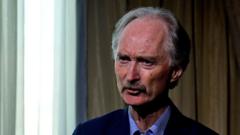The UN Special Envoy for Syria, Geir Pedersen, has underscored the necessity for the new leadership in Syria to honor its commitments to safeguarding the rights of various religious and ethnic groups. Speaking from Damascus, he observed that the citizens of Syria are caught between "a lot of hope and a lot of fear." Pedersen urged both internal and external parties to contribute to the nation's stability in this transitional phase.
The recent overthrow of Bashar al-Assad's regime by a rebel coalition, primarily led by the Sunni Islamist group Hayat Tahrir al-Sham (HTS), has triggered a shift in Syria's political landscape. HTS, which had distanced itself from its extremist roots since breaking away from al-Qaeda in 2016, is classified as a terrorist organization by multiple international entities, including the UN and the US. The group's leader, Ahmed al-Sharaa, has publicly renounced his past pseudonym to emphasize a new political direction for HTS.
Despite this, skepticism remains among the Syrian populace regarding HTS's commitment to implementing the promised reforms. Many citizens express doubts about the authenticity of HTS's intentions due to its previous history. Pedersen acknowledged these concerns and indicated that successful governance would require collaborative efforts involving various local factions and civil society groups.
The international community, according to Pedersen, stands ready to support Syria's new political phase. He noted that the lifting of sanctions and the possible removal of HTS from the terrorist list hinges on the group's subsequent actions in governance. Pedersen has expressed willingness to allow HTS a three-month period to demonstrate its commitment to positive change, during which time the group's interim government will operate.
When reflecting on the broader regional context, Pedersen criticized Israel's actions in Syria following Assad's downfall. He described these activities, including military operations in the Golan Heights, as detrimental to Syria's recovery. He urged Israel to refrain from further territorial occupation and emphasized the importance of not destabilizing the transitional process.
Moreover, the intricate power dynamics in northern Syria complicate the situation, especially regarding Turkey's existing relationships with HTS and its involvement with various rebel factions. Pedersen highlighted the paramount need for stability in Syria, pressing for the cessation of population displacements and advocating for the safe return of refugees.
Syria remains deeply fractured after over a decade of conflict, leaving many communities in disarray. In light of this, Pedersen called for HTS to initiate a healing process, particularly for the families of over 100,000 Syrians who have disappeared since the onset of civil unrest. He warned that failure to address these grievances might lead to renewed tensions or civil strife.
Ultimately, Pedersen emphasized that Syrians need to take charge of the rebuilding efforts. The international community must remain watchful as Syria enters this critical phase, with hopes for a brighter future contingent on the leadership's genuine adherence to reform and justice initiatives. The coming weeks and months will be crucial in determining the trajectory of Syrian stability, as well as the potential for lasting peace.





















